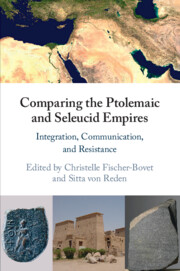Book contents
- Comparing the Ptolemaic and Seleucid Empires
- Comparing the Ptolemaic and Seleucid Empires
- Copyright page
- Contents
- Contributors
- Preface
- Note on Abbreviations
- Maps
- Introduction
- Part I Cities, Settlement and Integration
- Part II Communication and Exchange
- Part III Collaboration, Crisis, and Resistance
- Chapter 8 Legitimizing the Foreign King in the Ptolemaic and Seleucid Empires
- Chapter 9 Antiochus III, Ptolemy IV, and Local Elites
- Chapter 10 Regional Revolts in the Seleucid and Ptolemaic Empires
- Bibliography
- Index
Chapter 9 - Antiochus III, Ptolemy IV, and Local Elites
Deal-Making Politics at Its Peak
from Part III - Collaboration, Crisis, and Resistance
Published online by Cambridge University Press: 17 September 2021
- Comparing the Ptolemaic and Seleucid Empires
- Comparing the Ptolemaic and Seleucid Empires
- Copyright page
- Contents
- Contributors
- Preface
- Note on Abbreviations
- Maps
- Introduction
- Part I Cities, Settlement and Integration
- Part II Communication and Exchange
- Part III Collaboration, Crisis, and Resistance
- Chapter 8 Legitimizing the Foreign King in the Ptolemaic and Seleucid Empires
- Chapter 9 Antiochus III, Ptolemy IV, and Local Elites
- Chapter 10 Regional Revolts in the Seleucid and Ptolemaic Empires
- Bibliography
- Index
Summary
This chapter compares forms of political co-operation between the king, the Greek (or Hellenized) elites at the center and those at the peripheries during two wars of Antiochus III (222–187 BCE). The authors argue that these elites were a destabilizing factor in the structure of Ptolemaic and Seleucid imperial power. Their networks of communication were strong, becoming even more valuable, but also more fragile when war was threatening. Gerardin shows how the communication with the ruler could be compromised, especially in the case of the young Ptolemy V, and how Antiochus gained the support of elite and civic members, using some of the same strategies the Ptolemies had developed. Dreyer demonstrates that the political elites on all levels gained influence during the rivalry between Antiochus and Rome in Asia Minor because both based their influence on the rhetoric of the “freedom of the Greeks.” But the Romans did so more effectively by altering the rules of this diplomatic game. In both cases, the influence of civic and supra-civic elite network of communication was far more detrimental to the territorial power of both empires than so–called “ethnic” or “nationalist” revolts.
Keywords
- Type
- Chapter
- Information
- Comparing the Ptolemaic and Seleucid EmpiresIntegration, Communication, and Resistance, pp. 262 - 300Publisher: Cambridge University PressPrint publication year: 2021



